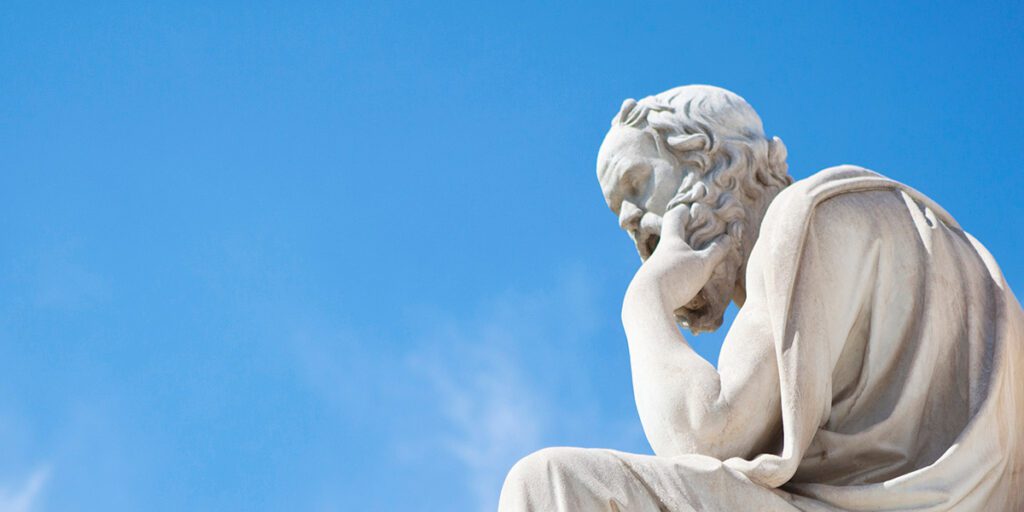“We are all born mad, some remain so,” Samuel Beckett had rightly said in Waiting for Godot. This quote depicts how we are not born wise. Whether taught directly or not, humans learn from the time of birth until the dust is bitten.
Since the thirst for knowledge in intellectuals is even more immense, a wise man learns from everything. He learns from others and also takes time to do some rational thinking. Now, I think coupling the rational art with what one has learnt from others is what makes wise.
On being rational — The ancient Greek sophists were criticised for believing that knowledge should come from the heart (based on feelings). As Galen would later say, rational thinking is what is done in the brain. He thought we all have the animal soul in the heart, though.
However preposterous they may sound, I inevitably get questions like this from my colleagues and students, and I don’t overlook them. They are things that must be made clear.
When it came at first, I answered:
Everything we get to know on our own has a link with the knowledge of others. Whatever you know about is something that already exists somewhere sometime.
Even Socrates learned from others (especially scientists) as men are supposed to be interdependent.
On the other hand, Albert Einstein was one of those who believed there should be a point in our lives where we stop learning so much from others and look within to manifest our own potential (he said this about books, at least).
This clarification by Albert is what I know every great thinker to believe in, nevertheless.
Consequently, I will say we cannot be wise until we combine our self reflection (rational thoughts) with other people’s wisdom.
I may be wrong but this is what I know.
In the remaining parts of this piece, I will concentrate on making you understand what was said in my first response to the question. Before long, we shall consider the concept of wisdom, how great thinkers learn from others, how a wise man achieves wisdom, and so on. Right now, we will continue to familiarise ourselves with the given topic.
What do we mean by learning from others? Well, I think this is all we basically do in life. Before a person thinks himself independent enough to start thinking rationally outside the wisdom of others, he must have learnt the art of thinking from others.
We learn from people by reading or listening to them, observing them or their works. We cannot be born and grow wise in isolation. There is a non-fictional story I think I need to remind you of, on accentuating this point.
How we cannot be wise on our own

Cases of people raised by animals have made it clear to us that learning from (others) around us is quite inevitable. There’s this documentary on the account of Kamala and Amala, two Indian children raised by wolves.
In 1920 when they were discovered by reverend Singh, Amala was 3 and Kamala was 8. Both were taken from the forest and given care at the reverend’s orphanage. The children found it hard to acclimate to society and they’d both howl at the moon. They ate raw meat.
That is our brains and minds for you. Not long afterward, however, they fell ill, and Amala died in 1921. This left Singh wondering if they would have survived in the wild instead.
Read Also: How literature affects our way of thinking
Despite being h0m0 sapiens, neither Amala nor Kamala could help thinking straight after living with wolves. We cannot be wise on our own. But what is wisdom itself?
The Concept of Wisdom
Wisdom is the art of practically using our knowledge and experiences in attending to the riddles of life intelligently. Knowledge and wisdom are separate ideas that are not to be confused for each other. Wisdom doesn’t make you knowledgeable, it is from being knowledgeable that wisdom stems. This is the reason wisdom is generally said to be ahead of knowledge.
Philosophers are thus regarded as being wise because they exhibit the trait of ‘love for knowledge’. They won’t stop being curious to know more.
Great Thinkers Learn from Others

The first of the trio Greek philosophers, Socrates, learnt from Prodicus among others. It should not also be a news that he developed his own theories by understanding that of the society he lived in and the things that needed improvement in it.
Similarly, Philosophy started as a science of sciences. Socrates was said to have doubted the accuracy of applied sciences, which shows how the knowledge of one thing can ignite or stem another in the mind of a thinker. If the pioneers of philosophy had not learned from others, the idea of initiating any system of thoughts will be blank, vague, and without form in their mind.
This is what I meant by ‘men are supposed to be interdependent’. Learn here and there.
Further, we saw how Marcus Aurelius (who was also a sage in his time) learnt from a number of other people in his book ‘Meditations’. This book gives an impression that makes a typical example of how wise people need to learn from others.
For instance, he learnt to be kind from his mother, and from Maximus, to be self-controlled. He learnt to be a constant admirer of philosophy and improvement from Severus, and not to be ruggedly critical of people’s words, from Alexander the Grammarian. Having developed his wisdom from many people, Marcus Aurelius eventually found himself inclining to Stoicism.
No one knows it all, and he who knows one thing does not know another. Both statements connote how gathering knowledge from different people as real-time sources will make you wiser. It is the game of every great thinker.
How a wise man Achieves Wisdom
You’ve probably heard that a wise man can learn more from foolish questions than a fool can learn from a wise answer. This is a paradox to remind wisdom seekers that one learns from anything.
As a result, it takes a genuinely open-mind to learn a lot. You want to focus on the point you can pick from relatively anything that comes your way, most especially by asking for clarifications. He who asks a question is a fool for a minute, but the one who doesn’t is a fool for life, to Confucius.
A wise man not only learns from others, but also takes time to question his knowledge and evaluate them. He is curious about the genuineness of facts. He wants to know what happens if the orthodox is broken or bent, and all of that.
In conclusion, no one can be genuinely wise if he doesn’t learn from others. We are bound to learn from others and, as Albert Einstein would propose, take time to think for ourselves.
Remember also, Edmund Burke said, “Reading without reflecting is like eating without digesting”. A wise man should see beyond my presentation herein. Take your time! And ask questions.
Share


